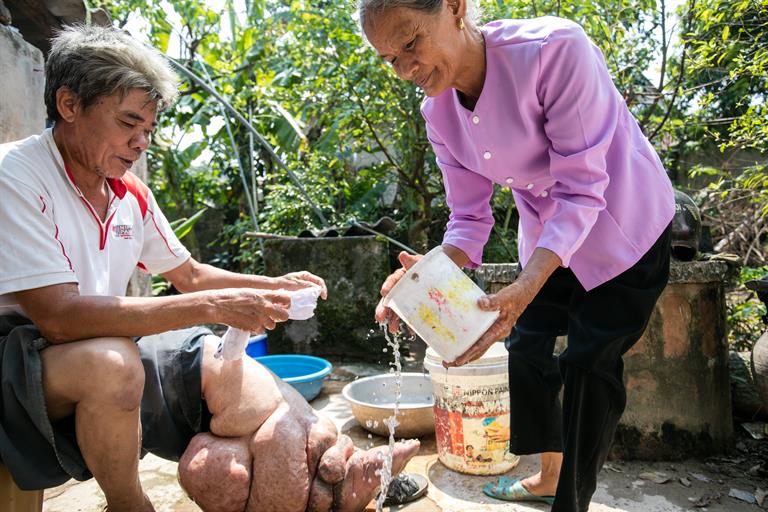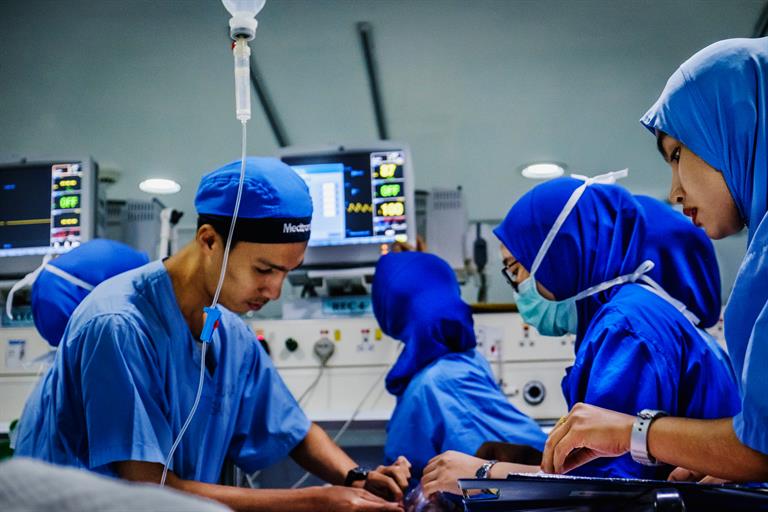MANILA, 11 October 2018 – Ministers of health and senior officials at the sixty-ninth session of the World Health Organization (WHO) Regional Committee for the Western Pacific today endorsed regional action agendas and frameworks to control and eliminate neglected tropical diseases, improve hospital planning and management, harness e-health to improve services and strengthen legal frameworks for health.
Controlling and eliminating diseases that stigmatize and discriminate
People living in tropical and subtropical areas who lack access to adequate sanitation, basic infrastructure and health services often suffer from neglected tropical diseases (NTDs)—a group of diseases that can have severe health impacts and lead to stigma and discrimination—of which 15 are endemic in the Western Pacific Region. Delegates today endorsed the Regional Framework for Control and Elimination of Neglected Tropical Diseases in the Western Pacific.
Photo: RTI International/Nguyen Minh Duc
The Region has seen remarkable progress in combating NTDs in recent years. Since 2016, nine countries and areas (Cambodia, Cook Islands, Marshall Islands, Niue, Palau, Tonga, Vanuatu, Viet Nam, and Wallis and Futuna) have eliminated lymphatic filariasis as a public health problem. Last year, Cambodia and the Lao People’s Democratic Republic eliminated blinding trachoma as a public health problem. The new Framework will build on these achievements and strive to end the scourge of NTDs in the Western Pacific.
Improving hospital planning and management
Delegates endorsed the Regional Action Framework on Improving Hospital Planning and Management in the Western Pacific. Although hospitals occupy a central place in health service delivery, countries can struggle to ensure hospital services are effectively planned and managed. The Framework provides guidance to countries on policies and actions to improve hospital performance, supporting efforts to increase equitable access to quality health services that are people-centred and do not cause undue financial hardship.
Photo: WHO/Y.Shimizu
Harnessing e-health to improve health service delivery
Delegates endorsed the Western Pacific Regional Action Agenda on Strengthening Legal Frameworks for Health in the Sustainable Development Goals. The Framework has five core action areas: health system governance; protecting and fulfilling rights; access to health services; preventing and managing public health risks; and addressing social determinants of health.
Legal frameworks affect health and the determinants of health in many ways. Laws organize and allocate responsibilities, set standards, and authorize and compel action. They are important as a tool of cooperation and coordination. As such, it is crucial for all stakeholders to understand their roles in the development and implementation of law.
Also today, the Regional Committee will discuss progress in health security, infectious and noncommunicable diseases, and environmental health. Tomorrow, health leaders are expected to endorse a regional framework on rehabilitation.
Related links:
More on the sixty-ninth session of the WHO Regional Committee for the Western Pacific
Neglected tropical diseases
Hospital planning and management
E-health
Legal frameworks for health
Notes to editors
The Regional Committee is streamed live on the WHO website www.who.int/westernpacificand updates are being posted on the @WHOWPRO Facebook and Twitter accounts with the hashtag #RCM69.
Working with 194 Member States across six regions, WHO is the United Nations agency responsible for public health. Each WHO region has its own regional committee, composed of ministers of health and senior officials from Member States, who meet annually. The Regional Committee sets policies and reviews WHO’s work over the previous year.
The 37 countries and areas of the WHO Western Pacific Region are: American Samoa (USA), Australia, Brunei Darussalam, Cambodia, China, Cook Islands, Fiji, French Polynesia (France), Guam (USA), Hong Kong SAR (China), Japan, Kiribati, Lao People’s Democratic Republic, Macao SAR (China), Malaysia, Marshall Islands, Micronesia (Federated States of), Mongolia, Nauru, New Caledonia (France), New Zealand, Niue, Commonwealth of the Northern Mariana Islands (USA), Palau, Papua New Guinea, Philippines, Pitcairn Islands (UK), Republic of Korea, Samoa, Singapore, Solomon Islands, Tokelau, Tonga, Tuvalu, Vanuatu, Viet Nam, and Wallis and Futuna (France).






